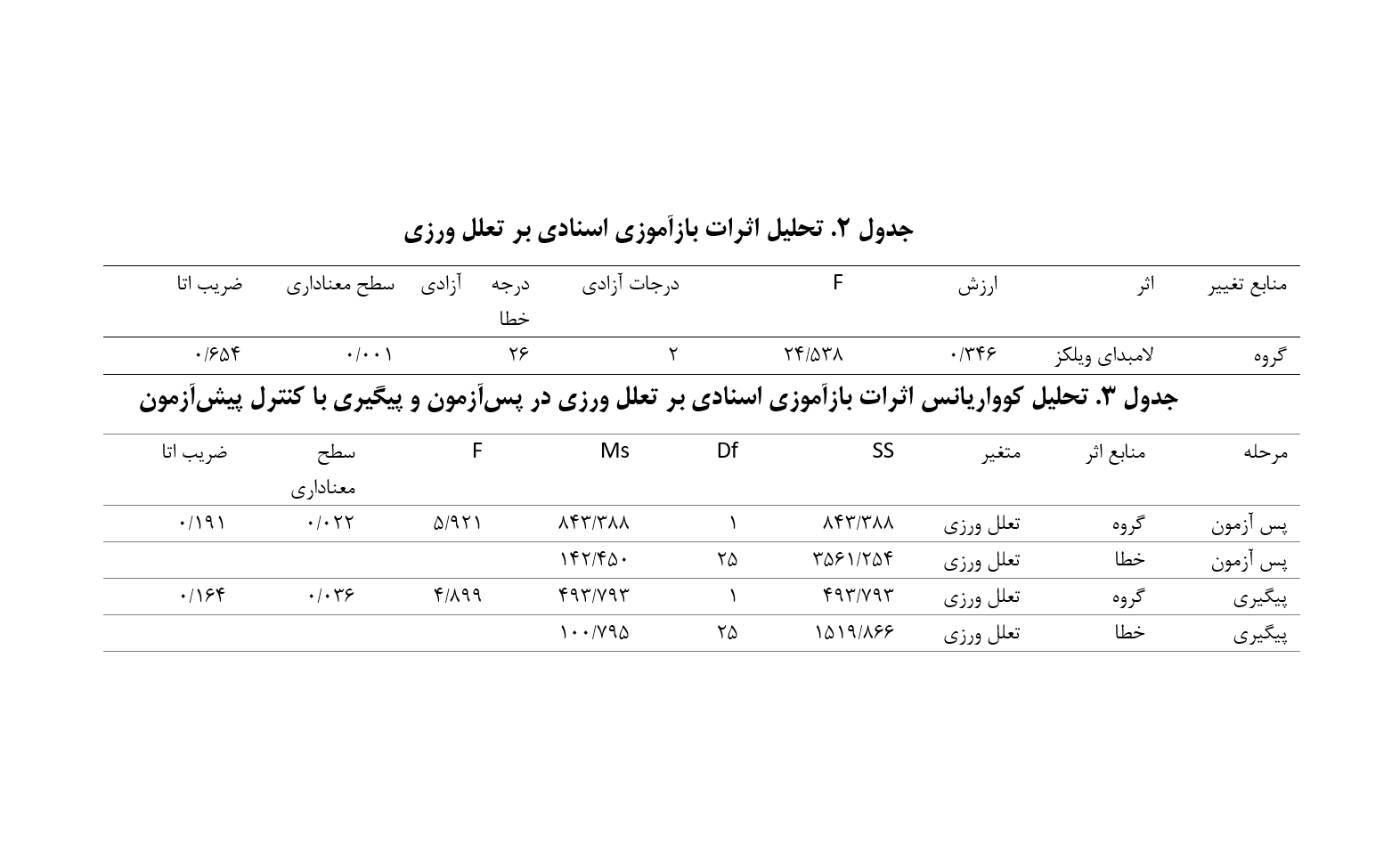The Effectiveness of Attributional Retraining on Academic Procrastination in Sixth-Grade Female Students
Keywords:
Attributional Retraining, Academic Procrastination, sixth elementary studentsAbstract
The primary aim of this study was to examine the effectiveness of attributional retraining on academic procrastination in sixth-grade female elementary school students. The research design was a quasi-experimental study utilizing a pretest-posttest design with a control group and a follow-up phase. The statistical population consisted of all sixth-grade female students in Hamadan, Iran, who were enrolled during the 2019–2020 academic year. From this population, 30 sixth-grade female students were selected through convenience sampling. They were randomly assigned to two groups: an experimental group (n = 15) and a control group (n = 15). The participants completed the Procrastination Assessment Scale–Student version (PASS, 1984) to measure academic procrastination during the pretest, posttest, and follow-up stages. The experimental group received 11 sessions of 45-minute attributional retraining, based on the program developed by Seligman et al. (1996). In contrast, the control group received no intervention. Data were analyzed using analysis of covariance (ANCOVA). The results indicated that attributional retraining had a statistically significant effect on reducing academic procrastination (p < .01). Based on the findings of this study, it can be concluded that attributional retraining can be utilized as an effective educational strategy to help students reduce their academic procrastination.
Downloads
References
Matteucci MC. Attributional retraining and achievement goals: An exploratory study on theoretical and empirical
relationship. European Review of Applied Psychology. 2017;67(5):279-89. doi: 10.1016/j.erap.2017.08.004.
Munda X, Tiwari VK. The Impact of Academic Procrastination on Students' Performance in Indian School Education
Systems: A Special Research Analysis-Vision 2045. 2024.
Sparfeldt JR, Schwabe S. Academic procrastination mediates the relation between conscientiousness and academic
achievement. Personality and Individual Differences. 2024;218:112466.
Steel P, Klingsieck KB. Academic procrastination: Psychological antecedents revisited. Australian Psychologist.
;51(1):36-46. doi: 10.1111/ap.12173.
Owens SG, Bowman CG, Dill CA. Overcoming Procrastination: The Effect of Implementation Intentions. Journal of
Applied Social Psychology. 2018;38(2):366-84. doi: 10.1111/j.1559-1816.2007.00309.x.
Rozental A, Forsstrom D, Lindner P, Nilsson S, Mårtensson L, Rizzo A. Treating procrastination using cognitive
behavior therapy: A pragmatic randomized controlled trial comparing treatment delivered via the internet or in groups. Behavior
Therapy. 2018;49(2):180-97. doi: 10.1016/j.beth.2017.08.002.
Rosa M, Pazos S, de-Cozar RS. Interventions to reduce academic procrastination: A systematic review. International
Journal of Educational Research. 2023;121:1-14. doi: 10.1016/j.ijer.2023.102228.
Grund A, Fries S. Understanding procrastination: A motivational approach. Journal of Personality and Individual
Differences. 2018;121:120-30. doi: 10.1016/j.paid.2017.09.035.
Pasalari M. Effect of attributional retraining on optimism, academic procrastination Ahwaz elementary students:
Persian Gulf University; 2020.
Parker PC, Perry RP, Chipperfield JG, Hamm JM, Pekrun R. An attribution-based motivation treatment for low control
students who are bored in online learning environments. Motivation Science. 2018;4(2):177-90. doi: 10.1037/mot0000081.
Morris M, Tiggemann M. The impact of attributions on academic performance: A test of the reformulated learned
helplessness model. Social Sciences Directory. 2013;2(2):3-15. doi: 10.7563/SSD_02_02_01.
Weiner B. The development of an attribution-based theory of motivation: A history of ideas. Educational Psychologist.
;45(1):28-36. doi: 10.1080/00461520903433596.
Li Y, Lan J, Ju C. Achievement motivation and attributional style as mediators between perfectionism and subjective
well-being in Chinese university students. Personality and Individual Differences. 2015;79:146-51. doi:
1016/j.paid.2015.01.050.
Sukariyah MB, Assaad G. The effect of attribution retraining on the academic achievement of high school students in
mathematics. Procedia-Social and Behavioral Sciences. 2015;177:345-51. doi: 10.1016/j.sbspro.2015.02.356.
Scheier MF, Carver CS. Optimism, coping, and health: assessment and implications of generalized outcome
expectancies. Health Psychology. 1985;4(3):219. doi: 10.1037//0278-6133.4.3.219.
Parsafar A. Investigating the Effectiveness of Motivational Interviewing on Social Anxiety and Academic
Procrastination Among Students. Jayps. 2024;5(3):55-64. doi: 10.61838/kman.jayps.5.3.6.
Alipour F, Farid A, Mosleh SQ. The model of academic procrastination based on academic self-handicapping and
perfectionism with the mediating role of students' sense of competence. Research in Cognitive and Behavioral Sciences.
;13(2):1-20.
Emami Khotbesara Z, Mahdian H, Bakhshipour A. Comparing the Effectiveness of Academic Buoyancy and
Psychological Capital Training on Academic Procrastination in Female High School Students. Iranian Journal of Educational
Sociology. 2024;7(3):149-60. doi: 10.61838/kman.ijes.7.3.18.
Joojam P, Safarpour-Dehkordi S. The Effect of Cognitive and Metacognitive Strategies on Self-Concept and
Academic Procrastination in Middle School Students. Excellence in Education Quarterly. 2024;3(2):6-10.
Liu Y, Zhou F, Zhang R, Feng T. The para-hippocampal-medial frontal gyrus functional connectivity mediates the
relationship and influence of optimism and procrastination by cognitive-behavioural attribution oriented training. Behavioural
Brain Research. 2023;48:44-66. doi: 10.1016/j.bbr.2023.114463.

Downloads
Published
Submitted
Revised
Accepted
Issue
Section
License
Copyright (c) 2025 Journal of Study and Innovation in Education and Development

This work is licensed under a Creative Commons Attribution-NonCommercial 4.0 International License.










